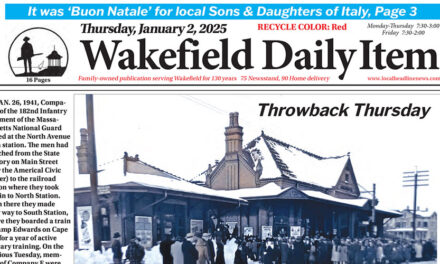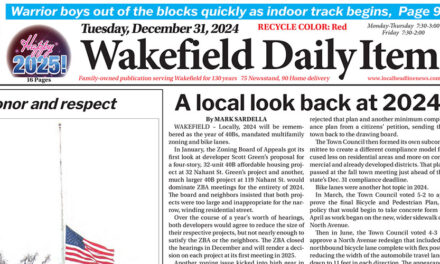Published in the June 30, 2016 edition
By MARK SARDELLA
WAKEFIELD — The Massachusetts campaign to oppose a measure seeking to legalize marijuana for recreational use is picking up steam, as State Senator Jason Lewis appeared before the Board of Selectmen on Monday to present the case for saying “no” to recreational pot.
Lewis headed a year-long study by a committee of Massachusetts lawmakers on the impact of legalizing recreational marijuana in Massachusetts. Based on everything that he learned, Lewis said that he is strongly opposed to the ballot measure that will likely go before voters in November seeking to legalize marijuana for recreational use and allow it to be sold commercially.
Lewis has joined “The Campaign for a Safe and Healthy Massachusetts,” a bipartisan effort to oppose recreational marijuana. The campaign is spearheaded by Gov. Charlie Baker, Speaker of the House Robert DeLeo and Boston mayor Marty Walsh.
Lewis said that a number of prominent health care, education and law enforcement organizations have joined the campaign against recreational pot, including all Massachusetts district attorneys and the Massachusetts Chiefs of Police. Wakefield Police Chief Rick Smith joined Lewis at the selectmen’s meeting Monday night.
Lewis dismissed pot proponents’ argument that the drug should be legalized to free up law enforcement resources and remove criminal liability from users.
“Massachusetts decriminalized marijuana possession in 2008,” Lewis said. “People are not being arrested or receiving a criminal record for possession of marijuana.” In addition, voters approved medical marijuana legislation in 2012, Lewis added. Residents who seek marijuana for therapeutic purposes are getting access.
Lewis said that the campaign to legalize recreational marijuana is being led by the commercial marijuana industry, which has already succeeded in a number of states, including Colorado and Washington.
The Massachusetts ballot question, he said, was written by and for the “billion-dollar, profit-driven” pot industry. He noted that when the ballot question was written, there was no one at the table from law enforcement, nor were there any health professionals or addiction specialists represented.
“The Massachusetts ballot measure is being overseen by the national lobbying group, the Marijuana Policy Project,” Lewis said, adding that the group’s board of directors includes manufacturers of marijuana edibles.
Legalization advocates would like people believe that we’re talking about the same marijuana that was around in the ‘60s. ‘70s and ‘80s, Lewis noted. But he said that the pot now being sold in states where it’s already legal is far more potent.
“Marijuana for sale in Colorado averages 17 percent to 18 percent THC, which is several times more potent than was common in the 1980s,” Lewis told the board.
A key part of the marijuana industry model is to offer highly concentrated forms of the drug, he said.
“The commercial marijuana industry is increasingly marketing marijuana in the form of super concentrated wax or ‘shatter,’” Lewis said, “with THC levels that typically run from 50 percent to 80 percent, consumed by ‘dabbing’ to produce a far more intense high.”
Furthermore, Lewis said that more than 50 percent of marijuana sales in Colorado are in the form of edibles and concentrates, which are aggressively marketed. He showed images of marijuana edible products which are packaged to look like gummy bears and Pop-Tarts (but called “Pot-Tarts”).
He said that the industry model involves dramatically expanding access to pot and “normalizing” the use of marijuana. He pointed out that in Colorado, there are more marijuana shops than Starbucks and McDonald’s combined. Denver alone, he said, has 454 marijuana businesses.
Lewis also discussed the impact of marijuana use on teenagers and young adults. He pointed to studies by the National Academy of Sciences and other organizations, showing that marijuana use by adolescents can impair brain development, impact long-term career growth and even lower IQ.
And where marijuana is legalized, teen use is higher, Lewis said, pointing to a study by the Substance Abuse and Mental Health Service Administration (SAMHSA), which found that the top 17 states in teen pot usage have legalized marijuana for commercial or medical purposes, with Colorado at the top of the list.
Lewis said that another common myth is that marijuana is not addictive. On the contrary, he maintained that one in six people who begin using as an adolescent will become dependent on marijuana.
“As we deal with an opiate crisis in our state, do we want to expand access to another addictive drug?” Lewis asked.
Lewis also addressed the impact of legal marijuana on driving. He cited Washington, another state that has legalized recreational marijuana, where fatal road crashes involving marijuana doubled after the drug was made legal.
Chief Smith said that he was concerned with the black market, which contrary to predictions, did not dry up when marijuana was legalized in Colorado. In fact, Smith said the black market has gone through the roof, with the state of Nebraska suing Colorado because so much pot was crossing the state line into Nebraska where it is still illegal.
Lewis said that the marijuana industry is targeting Massachusetts because it views the Bay State as the gateway to the entire east coast market.
But Lewis did sound an optimistic note.
“Public polling on this is shifting,” he said. “People are starting to learn what this is about. I think people are waking up to the fact that this is not what we want for Massachusetts.”




